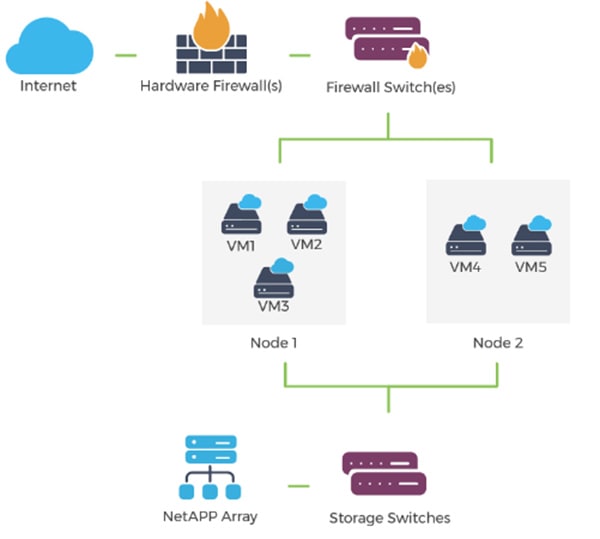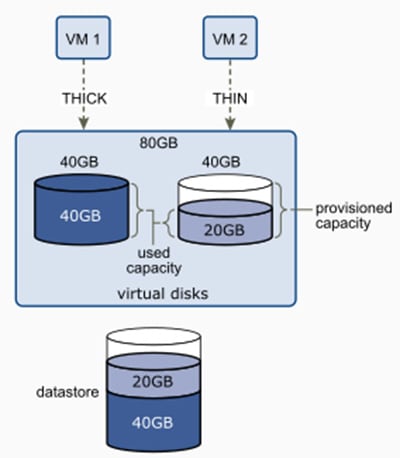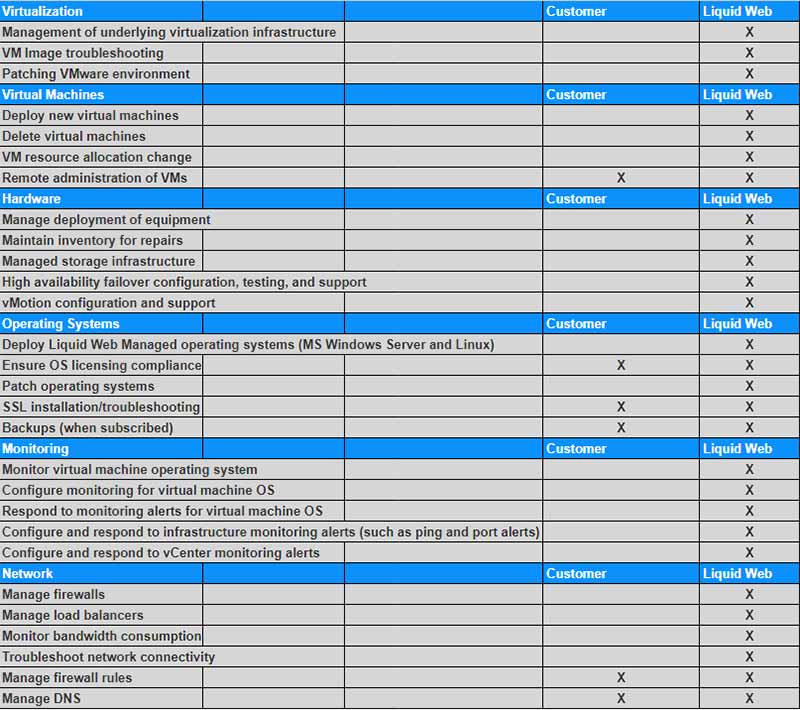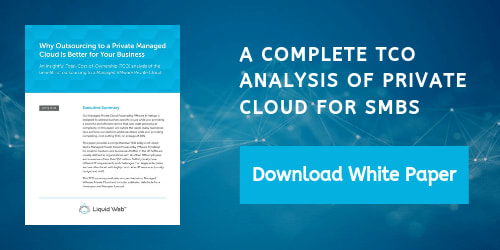
VMware is a global leader in cloud infrastructure. VMware, founded in 1998, brought revolution to the IT industry with its virtualization and cloud solutions. Today, the company has 75,000 partners across the globe, including Liquid Web with VMware Private Cloud Hosting. These partners are coming from various industries such as banking, healthcare, retail, telecommunications, and other various industries.
In this article, you will find out the answer to — “What is VMware Private Cloud?” — a revolutionary cloud solution for business owners seeking to consolidate infrastructure and gain high availability and redundancy.
What is VMware Private Cloud?
VMware Private Cloud is an isolated and secure cloud environment. With ESXi Hypervisor and vCenter at the center, you can view, stop, and start your virtual machines easily. VMware stack components can be added based on your needs, such as Storage vMotion, vMotion, vSwap, vSphere HA, VMware Snapshots, DRS, EVC, and Thin Disk Provisioning.
Think of Private Cloud as a massive pool of resources which is capable of spreading those resources on-demand. When you need them, where you need them.”
In case you need more control, enhanced access can be provided. Consoling into your VMs is an option as well.
Are There Different Types of Private Cloud?
Just like any other hosting solution, private cloud has three different types of the services.
Virtual Private Cloud
A Virtual Private Cloud is a remotely-hosted private cloud instance located within a public cloud. This type of Private Cloud is a bit different from the rest, because it exists in a separate area of public cloud instead of being hosted on-premises.
Hosted Private Cloud
A Hosted Private Cloud is a type of cloud hosted by a cloud service provider on-premises, most likely in a data center. This type of cloud isn’t shared with other organizations, and the cloud service provider is the one who manages the network and takes care of the hardware that is behind the cloud. Software updates are also taken care of by the cloud provider.
Managed Private Cloud
A Managed Private Cloud is the type of private cloud that Liquid Web offers through VMware Private Cloud. A Managed Private Cloud hosting provider is responsible for networking, hardware, software, and day-to-day operations of the private cloud. With this being a managed service that has few different deployments, we are also offering a couple of additional perks with our product, including our dedicated vCenter to safeguard your data, and VMware backups that are powered by Acronis Cyber Backup. The Managed Private Cloud can save businesses considerable time and money in the long run.
Liquid Web Private Cloud Powered by VMware and NetApp
VMware Private Cloud gives you all the benefits of a public cloud with the sheer strength, flawless performance, and fortress-like security of an isolated environment on enterprise-class hardware.
Specifically, we are offering a managed VMware environment that uses ESXi to virtualize two or more physical servers and create guest VMs that operate on a hardware cluster backed by NetApp SAN.
The number of virtual machines that you can create depends only on the resource that you have at your disposal.
Before we explore the technology further, let’s explore the terminology and technology behind VMware.
ESXi
ESXi is a bare metal hypervisor. A hypervisor is a virtual machine monitor, or a virtualization software, that allows you to create and manage your virtual machines. ESXi is installed directly onto the physical server.
Some of the features that ESXi is offering are:
- User-friendly experience due to modern user interface based on HTML5
- Enhanced security because of the powerful encryption capabilities
- Reliable performance because you are able to apply individual solutions to each of yours virtual machines
If you are considering a managed private cloud, Liquid Web can provide you with an unmanaged private cloud which can be used for custom licensing.
Hardware Cluster (HW Cluster)
Hardware clustering is a hardware-based method to combine two or more servers (nodes) into a cluster that will work as a single system.
NetApp Storage Area Network (SAN)
A NetApp Storage Area Network (SAN) is the most used storage networking architecture when it comes to enterprise setups. SAN stores your data within centralized shared storage, and all data travels through the network. That way you get much better performance, latency is lower, and it costs less than hard disk drives (HDD).

How Does VMware Private Cloud Work?
Everything starts with the NetAPP Storage Area Network (SAN), your storage entity that is operated by System Manager software. The NetAPP SAN array then sends the data to storage switches.
A storage switch is a device which is routing traffic between your clustered servers and your SAN.
The storage switches then route data to your nodes or clustered servers. Each of the servers (nodes) can have unlimited numbers of virtual machines running on them; your resources limit the amount of virtual machines possible.
Once your nodes, and the virtual machines on them, receive the data from storage switches, your developers can apply necessary patches or tweaks to your application or website. After that, they can deploy to a live environment.
Next, the data is sent from the virtual machines on your nodes to firewall switches and through the hardware firewall.
A firewall switch is a device similar to the storage switch. The purpose of a firewall switch is to route traffic from your virtual machines and nodes to the hardware firewall, and vice versa.
A hardware firewall is a physical device that filters traffic that is coming and going from your cluster with rules set to block malicious traffic from entering your server.
Once traffic reaches a hardware firewall and it is filtered, it is ready to be served on the Internet.
What Features Come With VMware Private Cloud?
VMware vSphere High Availability (HA)
This is pure gold when it comes to making sure that your application or site runs all the time, no matter what happens. vSphere HA monitors all server hosts that are running in ESXi, and it is detecting for critical failures.
In case one of the virtual machines goes down for any reason, vSphere HA will immediately failover anything that was going on in that VM to another VM that is up and running. On top of that, vSphere HA will check if there are enough available resources to restart the VM that is down. If there are enough resources, the VM with the critical failure will be restarted.
Distributed Resource Scheduler
A Distributed Resource Scheduler (DRS) makes sure that all virtual machines that are deployed always have enough resources to run properly.
For example, let’s say that your VMware setup includes two nodes, with each node running five virtual machines. Suddenly, one of the virtual machines on one of the nodes starts to get overloaded with traffic and thus begins to consume more resources. DRS will notice the resource imbalance due to increased traffic, and will move the VM between hosts to make sure that resources are balanced.
vMotion
VMware vMotion is used to perform live migrations without service interruption. You can migrate everything that you deployed between the hosts, and everything will be accessible during the migration.
Yes, zero downtime during the process! vMotion is today’s standard when it comes to live migrations.
Migrations are performed through a migration wizard, which quickly identifies the best host to migrate your virtual machine to. It uses real-time information gathered by the migration wizard. You will always know how much resources you have, as well as how much resources the VM that you are migrating to will have.
vMotion can also run multiple migrations at once.
Storage vMotion
Storage vMotion works very similar to vMotion. The main difference is that vMotion moves workloads between hosts, while Storage vMotion is moving virtual machines between your disks and storage media in your SAN with zero downtime.
vSWAP
This technology comes in handy when you are working with limited resource and constrained workloads. vSwap allows your virtual machines to use the memory of the hosts on which they are running instead of the disk memory, which can improve performance dramatically when your disk memory is having a tough time with the workload.
VMware Snapshots
With VMware Snapshots, you can make any changes on your setup without the fear of completely destroying months and months of work. Just save a snapshot of your virtual machine before you make changes, and if something goes seriously wrong, you can roll back to the snapshot. You can have multiple snapshots stored at once (up to 32 snapshots total), but VMware suggests that you do not keep a single snapshot for more than 72 hours.
Enhanced vMotion Compatibility
Enhanced vMotion Compatibility (EVC) makes sure that you avoid any failures during migrations or upgrades due to incompatible CPUs. EVC achieves this by ensuring that all hosts in a cluster present the same CPU feature set to virtual machines, even if the actual CPUs on the hosts differ. To put it simply, EVC is masking the CPU that is showing to the virtual machines.
Thin Disk Provisioning
Thin Disk Provisioning ensures that virtual machines that you deploy use the amount of disk space that they actually need, no matter how much disk space you provision for a virtual machine during the deployment. This type of disk provisioning is enabled because we are using ESXi for our hypervisor.
In the image below you can see an example on how disk space is utilized with Thin Disk Provisioning.

Liquid Web’s VMware Private Cloud Packages and Management
With Liquid Web’s VMware Private Cloud, all of the technologies above are included in all of our plans. Best of all, our Private Cloud is a fully managed product, which means that we take care of everything for you, giving you more time to focus on growing your business.
Below is a complete breakdown of what we are managing for you, and what you have access to, in your Private Cloud.

As you can see, all the major aspects of the private cloud are handled by Liquid Web.
Please note: Liquid Web only supports CentOS 7 and Windows 2016 operating systems at this time. You do have the option to use other operating systems if you prefer, but we will not support those. Also, we support cPanel and Interworx on CentOS 7, as well as Plesk on CentOS 7 and Windows. Core managed and unmanaged versions of CentOS 7 and Windows 2016 can also be applied on your virtual machines, if you so choose.
What Are Some Real World Use Case Examples of VMware Private Cloud?
Point-of-Sale (POS) Software
Let’s say that you have developed a point-of-sale (POS) software which will run on Mac, Android, or PC. Let’s also say that your software plugs into WooCommerce directly. Your whole product would have to be composed of a bunch of smaller components. Ideally, you would want to run web servers, java application servers, a database server, and additional various services. All of these components would have to be logically separated with uptime as a key component, since POS systems need to be online at all times.
Liquid Web’s Private Cloud is the perfect solution for this type of setup! If anything goes amiss, the VMware software that is running on our Private Cloud will move all VMs to another node, and uptime will continue to be achieved.
Business-to-Business eCommerce Application
In our second scenario, let’s say that you are running an application that is constantly creating small virtual machines on your nodes. Those virtual machines are constantly gathering data which is stored and written in a database. Now, imagine if your database server goes down while a massive query is underway.
On dedicated servers or VPS servers, a database server going down would probably corrupt the database, and restoring the server would cause some downtime. However, with VMware Private Cloud, you have nothing to worry about. VMware can sustain these types of issues and you won’t have to rebuild your application on the virtual machine. You may see a moment of downtime, and then your query will continue to run just like it did before the database server went down.
Booking and Client Management Software
Now imagine that you are building a booking application for a client that is running a chain of Spa Salons across the state of Michigan. This means that your software has to be quite big to manage such high numbers of clients in several different locations. Suddenly, the booking application receives a spike of 400 new bookings for the next two days at one of the locations. All of those bookings have to be processed, and at this point the Distributed Resource Scheduler kicks in and redistributes resources from other virtual machines to assist. Additionally, vMotion will come in handy for setups like this because VMs will run out of space eventually and upgrades can be done with no downtime.
Is VMware Private Cloud Right For Me?
In today’s hosting world, high availability and resources on-demand are something that will keep you in front of the competition. VMware Private Cloud provides all the tools necessary for your business to host successful websites and applications for years to come.
[ad_2]
Source link







